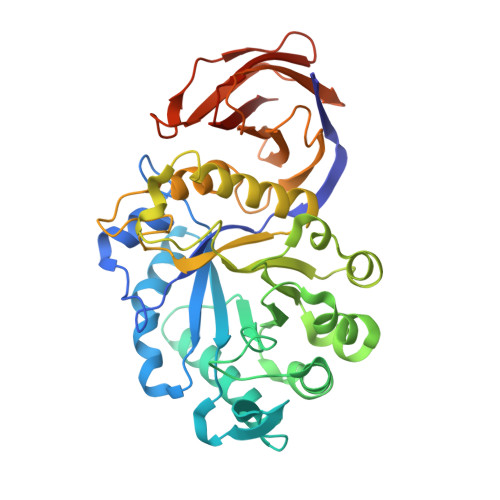Ligand bound structures of a glycosyl hydrolase family 30 glucuronoxylan xylanohydrolase.
St John, F.J., Hurlbert, J.C., Rice, J.D., Preston, J.F., Pozharski, E.(2011) J Mol Biology 407: 92-109
- PubMed: 21256135
- DOI: https://doi.org/10.1016/j.jmb.2011.01.010
- Primary Citation of Related Structures:
3KL0, 3KL3, 3KL5 - PubMed Abstract:
Xylanases of glycosyl hydrolase family 30 (GH30) have been shown to cleave β-1,4 linkages of 4-O-methylglucuronoxylan (MeGX(n)) as directed by the position along the xylan chain of an α-1,2-linked 4-O-methylglucuronate (MeGA) moiety. Complete hydrolysis of MeGX(n) by these enzymes results in singly substituted aldouronates having a 4-O-methylglucuronate moiety linked to a xylose penultimate from the reducing terminal xylose and some number of xylose residues toward the nonreducing terminus. This novel mode of action distinguishes GH30 xylanases from the more common xylanase families that cleave MeGX(n) in accessible regions. To help understand this unique biochemical function, we have determined the structure of XynC in its native and ligand-bound forms. XynC structure models derived from diffraction data of XynC crystal soaks with the simple sugar glucuronate (GA) and the tetrameric sugar 4-O-methyl-aldotetrauronate resulted in models containing GA and 4-O-methyl-aldotriuronate, respectively. Each is observed in two locations within XynC surface openings. Ligand coordination occurs within the XynC catalytic substrate binding cleft and on the structurally fused side β-domain, demonstrating a substrate targeting role for this putative carbohydrate binding module. Structural data reveal that GA acts as a primary functional appendage for recognition and hydrolysis of the MeGX(n) polymer by the protein. This work compares the structure of XynC with a previously reported homologous enzyme, XynA, from Erwinia chrysanthemi and analyzes the ligand binding sites. Our results identify the molecular interactions that define the unique function of XynC and homologous GH30 enzymes.
- Department of Pharmaceutical Sciences, University of Maryland School of Pharmacy, Baltimore, MD 21201, USA. fjstjohn@gmail.com
Organizational Affiliation:

















